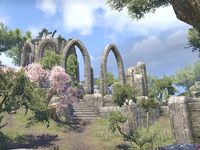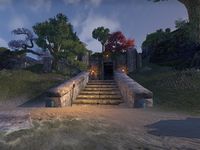Lore:Death/Altmer
Altmer Beliefs and Customs[edit]
Altmer worship Xarxes, one of their Eight Divines, as the god of the deceased, equivalent to other races' death gods. He records the life-stories of all the elven races, and his worship, at least as recorded in written history, predates that of Arkay.[1]
In the two most common origin myths, Xarxes appears either as Auri-El's scribe, recording events at his side since the beginning of time, or as a Merethic Aldmeri priest of Auri-El who was elevated to divinity by the higher deity. The latter story is consistent with the High Elves' conceit that they are directly descended from the Aedra, and can, in certain miraculous circumstances, apotheosize and re-ascend to godly status.[1] For the Altmer, Xarxes records not just the life stories of individual elves, but all the connections of lineage and heritance that bind them together and link them to their ancestors. As nothing is more important to an Altmer than their ancestry, it is easy to understand Xarxes' paramount role in defining and maintaining status and stability in Summerset society.[1]
Upon death, the Altmer (including Direnni)[2] believe they ascend to Aetherius.[3][4] To the Altmer, mortal life is nothing more than a punishment imposed by the trickery of Lorkhan to the Eight original Divines.[5][6] And, although they venerate their ancestors, they only do so by respecting the orderly and blissful passage of these spirits from this world to the next. That is, High Elves believe it is cruel and unnatural to encourage the spirits of the dead to linger in Mundus.[7][8] For those who die in dishonor, their families will strike all traces of their existence from their records, and they will not be remembered as an ancestor. They will simply vanish from memory, a fate worse than death itself.[9][10]
Altmer Funerary Customs[edit]
Altmer do not bury their dead. Sentimental folks may erect shrines or make something to remember a lost loved one by.[11] The High Elves cremate their dead and then bury their ashes in wall shrines.[12] Both Altmer kinlords and kings commonly built massive mausoleums where successive generations rest, and their descendants, especially new rulers, come to present their respects and to seek guidance. Due to this, these sites also serve as temples to the Ancestors.[12][13] Priests dedicated to tending the dead keep these places clean from corrupting influences, commonly bearing holy symbols imbued with divine power to repel necromantic magic.[14][15]
Altmer highly respect their deceased, any necromancer caught in the Summerset Isles can expect the worst possible punishments.[16] In the case that the defiler is an Altmer who has grown too powerful, there are special magical prisons for them to be confined to. The Banished Cells in northernmost Auridon are the paramount example of this. High Kinlord Rilis XII of Firsthold was imprisoned here after he tampered with forbidden knowledge and consorted with Daedra in pursuit of magical power.[17]
References[edit]
- ^ a b c Tu'whacca, Arkay, Xarxes — Lady Cinnabar of Taneth
- ^ Keeper's Letter — Temeye
- ^ Ayrenn: The Unforeseen Queen — Headmaster Tanion of the College of Aldmeri Propriety
- ^ The Gifts of Magnus
- ^ Folly of Man
- ^ The Monomyth
- ^ Uricantar's Journal — Uricantar
- ^ Ancestors and the Dunmer
- ^ Emile Oncent's dialogue during Murder In Lillandril in ESO: Summerset
- ^ Calawende's dialogue during Murder In Lillandril in ESO:
- ^ Earl Leythen's dialogue at the beginning of The Crystal Tower in ESO Summerset
- ^ a b Tanzelwil's loading screen in ESO
- ^ Ayrenn's dialogue during In the Name of the Queen in ESO
- ^ On the Holy Symbol — Advisor Norion
- ^ Priestess Langwe's dialogue during Corruption Stones in ESO
- ^ Corpse Preparation
- ^ The Banished Cells I loading screen in ESO
| ||||||||||||||

